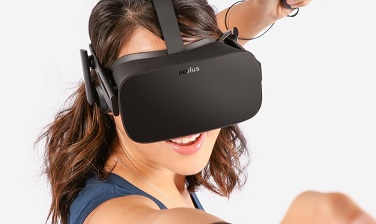Virtual reality and the future of recruitment
 Have you ever played Job Simulator? It’s a virtual reality game set in 2050. In the game, jobs are automated and players take part in comical approximations of what real-world jobs must have been like to do when humans, rather than robots, had to perform them.
Have you ever played Job Simulator? It’s a virtual reality game set in 2050. In the game, jobs are automated and players take part in comical approximations of what real-world jobs must have been like to do when humans, rather than robots, had to perform them.
Let me tell you: it’s great fun! It might also be a window into a not-too-distant future of recruitment where VR could be used to prepare candidates for real-life job interviews and perhaps even the jobs themselves.
Using computers to prepare for job interviews is nothing new. At time of writing, Googling ‘job interview’ generates more than 38m returns; while searching for ‘job interview online course’ returns 19m. Desktop computers, mobiles and tablets are the go to devices when preparing for an interview.
But beyond a simple search for advice articles, technology has started to make real inroads into recruitment.
There are already programs such as SIMmersion’s ‘Job Interview Training with Molly Porter’. The technology was inspired by an algorithm the company developed for FBI agent training then developed further to help ex-military personnel who suffer with PTSD to increase their interview skills.
YouTube even has 360 ‘VR’ coaching videos. One is Paolo Tosolini’s 360 VR Coaching: Simulation of a job interview. It allows users to ‘look’ around, as if from the interviewees perspective.
These are just two examples of what is now possible. Each serves its purpose, but there is still a disconnect. The space between the viewer and the screen still separates the user from the real-life stresses of being in the situation for real.
This is where VR comes in…
As technology becomes ever more powerful, accessible, and affordable, VR is becoming a mainstream option. From budget platforms – like Google Cardboard, Daydream VR, or Samsung’s Gear VR – that use a mobile phone, to more sophisticated tools – like Oculus Rift, HTC Vive and Sony’s own PlayStation VR – most us are in possession of technology that can place us within a fully immersive, 360, 3D simulation.
In theory, future job candidates could prepare by placing themselves ‘inside’ the interview room; thus, experiencing, ahead of time, something closer to the stress and strain of the interview proper.
Or are we approaching a point where candidates and interviewers don’t even need to be in the same room? Or where an initial phone interview could take on a whole new meaning?
With current technology, these last two scenarios are hard to imagine. After all, no one wants to conduct – or take part in – an interview with a large screen strapped to their face, it’s just not a good look. But technology is improving all the time. Already, the PlayStation VR is significantly more comfortable than its Facebook and HTC rivals – and there are further variants to come that are significantly less intrusive: Microsoft’s HoloLens will, for example, augment reality by overlaying an image on the user’s real world view using a transparent screen. Then there’s MagicLeap’s version of this technology, which, it is rumoured, could remove the need for a screen to be placed in front of the viewer’s eye altogether.
Could interviewer and interviewee be in the same virtual room, without anything obstructing their view of the real world or one another, without either being present? It’s a staggering thought.
But what if we take it one step further? Could interviewers test a candidate’s aptitude for the job by putting them in a VR simulation of the role itself, during the interview?
Last year, I attended a series of BAFTA Games lectures where Jade Raymond discussed Gamification in the work place. Another had Rhianna Pratchett discussing the depths she goes to when writing narrative for videogames such as Rise of the Tomb Raider.
Could we eventually see creatives like these developing products used in the interview process?
Suddenly ‘Job Simulator’ seems like less of a game and more of a vision of what’s to come.
Right now, we don’t know exactly how VR and AR technology will change recruitment. It could be in training, tests, interviews, something else entirely, or all these things.
What we do know, however, is that Facebook announced this week that it’s rolling out a new ‘Jobs’ tab for its users’ pages. Now, Facebook owns Oculus Rift, so it doesn’t take a great leap of imagination to see just how close we may be to VR and AR, in one guise or another, playing a Very Real role in the future recruitment.
We all had better be prepared to embrace it.
James Dodd
Senior Consultant
james@trippassociates.co.uk
+44 (0)7775 515 866
Follow @jamestrippassoc
trippassociates.co.uk